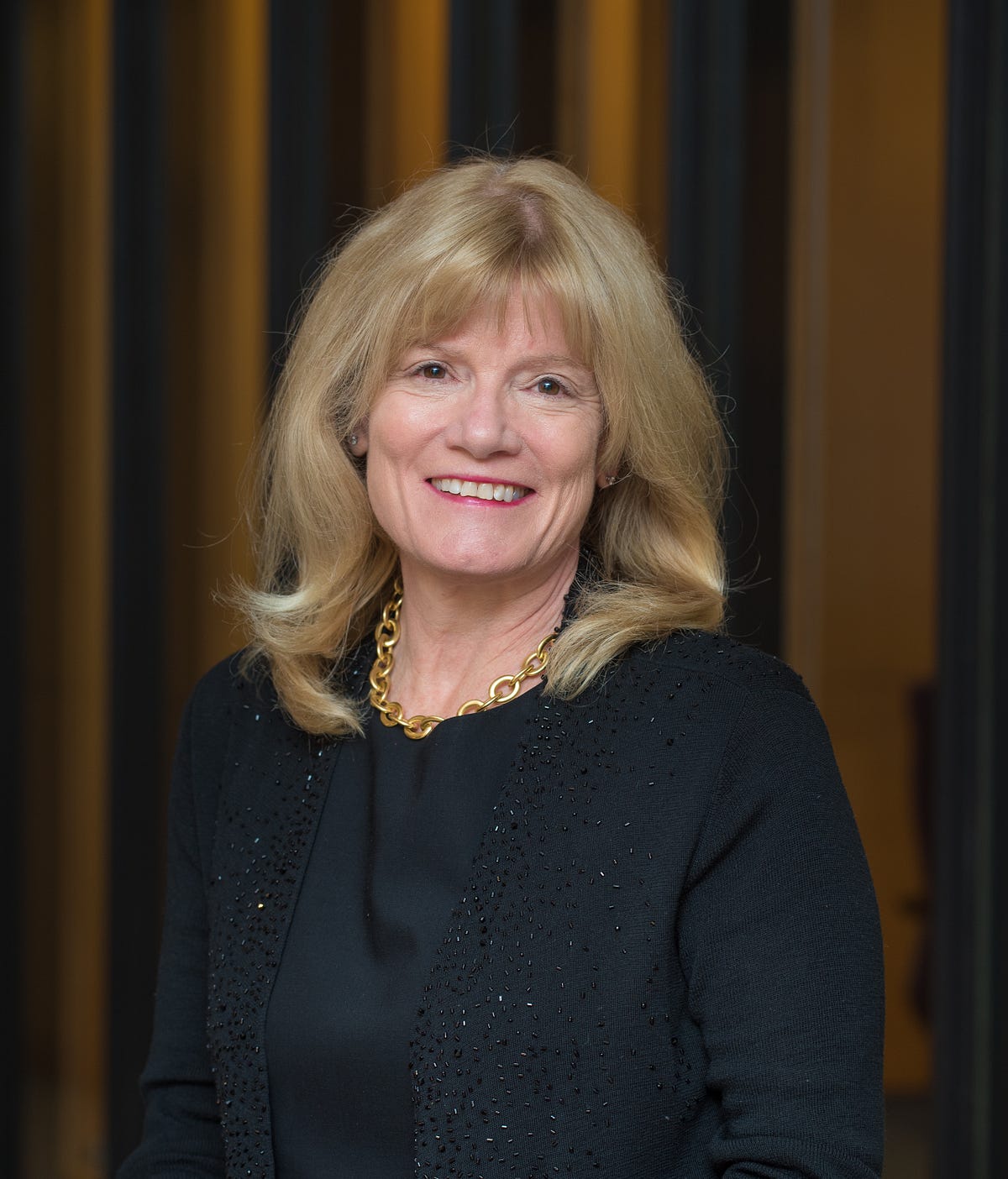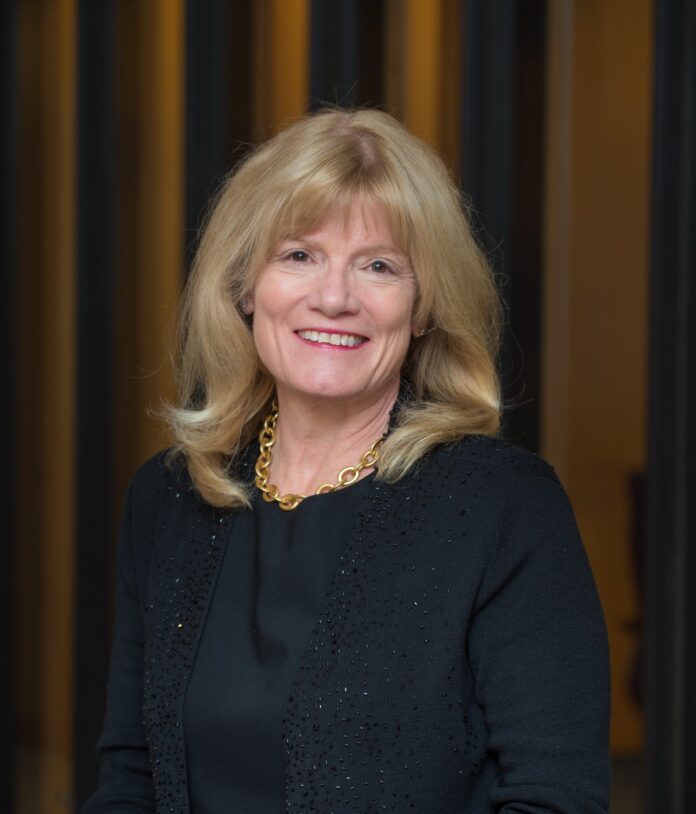“We started a movement to create an age-friendly health system” With Terry Fulmer of The John A. Hartford Foundation

“Hire the very best people on the planet, delegate and trust your team. Mistakes will happen and everyone should use the IHI framework of continuous quality improvement. That means that every mistake is a learning opportunity and everyone has the chance to learn and move forward.”
I had the pleasure to interview Terry Fulmer. Terry is President of The John A. Hartford Foundation in New York City, a foundation dedicated to improving care of older adults. She is a nurse and nationally and internationally known for her cutting-edge work in geriatrics and care of older adults. She was named one of the top 50 influencers in aging by Next Avenue in 2016.
Thank you so much for doing this with us! Can you tell us a story about what brought you to this specific career path?
My mother was a nurse and I thought she was amazing. She always knew how to help us when we had any kind of symptom and I was so proud of her. I have never second-guessed my career decision — it has been a gift every day. My daughter is a nurse, my sister is nurse, and I don’t know why everybody is not a nurse!
Can you share the most interesting story that happened to you since you began leading your company?
Leading a major philanthropic organization is so inspiring. Of greatest interest, I have opened a whole new window into the world of finance because it is so important to the well-being of our endowment! I’m fascinated by the meetings I am now invited to. To my surprise, I am finding the world of hedge funds and investment banking fascinating!
Can you share a story about the funniest mistake you made when you were first starting? Can you tell us what lesson you learned from that?
Most mistakes in nursing are not very funny… But I do recall having a really difficult time finding the right words to ask patients when I needed them to roll over so I could give them a shot. It just seemed so rude to say words like fanny, bottom, behind. To this day, I really have to think about it and consider which word is right for which patient! The lesson I learned was how important it is to personalize every conversation I have based on who’s listening.

What do you think makes your company stand out? Can you share a story?
Our foundation stands out because of the extraordinary legacy of A&P grocery stores. The founders, John and George Hartford, were true geniuses. They were in the grocery business at a time when distribution and management of food was so very different than what it is today. There were many mom-and-pop grocery stores and because of their vision, a number of those stores were put out of business and the price of food was reduced. You would think that lower food prices would be welcomed but in fact, they were brought to court under the Sherman antitrust act. Today we call that Amazon. These two men began our foundation in 1929 in order to “serve the greatest good for the greatest number of people”. They live their life by that philosophy and that is the way we work in our foundation every day. Our mission is to improve the care of older adults and this is very, very important! The demographics are clear and we know that our founders would be very proud of our work.
Are you working on any exciting new projects now? How do you think that will help people?
Absolutely! One of our most exciting initiatives is our AGE-FRIENDLY HEALTH SYSTEMS work that we’re doing with the Institute for Healthcare Improvement (IHI), based in Boston. This is crucial work because currently, there is no such thing as an age-friendly health system! Older adults suffer from care that is not evidence-based and not responsive to their own care goals. This is most unfortunate because we have the evidence-based practice protocols that can deliver high-quality and focused care for them. IHI, world renowned for its work in spreading and scaling the best care available, is working tirelessly to help get our age-friendly evidence based practice protocols in place nationally and internationally. We explain our work as the 4M’s: what Matters, Medications, Mentation, and Mobility. These four constructs are absolutely the essential baseline for best practice with older adults. It’s clear that they interact in many significant and sometimes dangerous ways. The 4Ms are a gateway into best practice with older adults is what every older person should demand and expect. We think of our work as a social movement and we want to look back in 10 years and say what took us so long? And why were we not doing this before?
What advice would you give to other female leaders to help their team to thrive?
Use your networks and expect a seat at the table. Ask inconvenient questions and keep your sense of humor.
What advice would you give to other female leaders about the best way to manage a large team?
Hire the very best people on the planet, delegate and trust your team. Mistakes will happen and everyone should use the IHI framework of continuous quality improvement. That means that every mistake is a learning opportunity and everyone has the chance to learn and move forward.
None of us are able to achieve success without some help along the way. Is there a particular person who you are grateful towards who helped get you to where you are? Can you share a story about that?
I am indebted to many people who have helped champion my work and me personally. Certainly, my family members have been my biggest fans and always there for me. This is especially great because I’ve a very large family! My husband Keith is my rock and my rock star. Further, my professional career was set on a very positive path very early on by my hero, Trish Gibbons, at the Beth Israel Hospital in Boston. She died way too young and I miss her every day.

How have you used your success to bring goodness to the world?
I know I am bringing goodness to the world because every day I improve care for the elderly! What could be more important than that?
What are your “5 Leadership Lessons I Learned From My Experience” and why. (Please share a story or example for each.)
The five leadership lessons are as follows:
a. Be nice. It’s such a basic principle and when I think back about my worst career moments it was always because there was a hostile environment, bad behavior, and unnecessary meanness. Being nice is contagious.
b. Hire the smartest people you can find. Never be afraid to let your staff outshine as it only makes you look better. When I was at Northeastern University in Boston, I had the great good fortune to hire John Auerbach, the former Commissioner for Health of the State of Massachusetts. I immediately looked like a genius and had the extraordinary guidance and input from John every day. What a gift.
c. Say you’re sorry. There are so many times in any given week when I’m wrong and the most important thing I can do is to own it and apologize. I’m always amazed at how hard it can be for some people to learn this lesson and withhold the apology that should’ve gushed out.
d. Assume you’re replaceable. A fallacy in leadership roles is that any of us are so important that we can’t be replaced. Deep inside we all know this is not the case. Not only should we assume we are replaceable, but we should also be actively working on succession planning every day. That’s a way to keep your industry healthy.
e. Make time for the people you love. As a nurse I am constantly reminded of how precious every day is and how important it is to be with those you love, show your love and enjoy the love in return.
You are a person of great influence. If you could inspire a movement that would bring the most amount of good to the most amount of people, what would that be? You never know what your idea can trigger. 🙂
I would most certainly work on age-friendly health system movement as I’m doing right now! I’m absolutely positive that this is the moment to get this right, it’s feasible and it’s our moral responsibility. Please join me!
Can you please give us your favorite “Life Lesson Quote”? Can you share how that was relevant to you in your life?
Without leaps of imagination, or dreaming, we lose the excitement of possibilities. Dreaming, after all, is a form of planning. This quote is from Gloria Steinem one of my all-time heroes.
Some of the biggest names in Business, VC funding, Sports, and Entertainment read this column. Is there a person in the world, or in the US with whom you would love to have a private breakfast or lunch with, and why? He or she might just see this if we tag them 🙂
There are so many people I could name here but currently I would say Oprah Winfrey because if she gets into the age-friendly health system movement, I know we can change the world!


